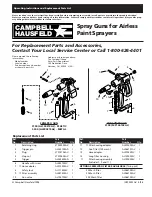
24
© Titan Tool Inc. All rights reserved.
Hydraulic Motor
Hydraulic Motor Service Instructions
Disassembly
1. Disconnect the high pressure hose line from the elbow
(31, in Hydraulic System parts list) on the back of the
rotary pump.
2. Remove the two mounting screws (22 and 23, in Cart
Assembly parts list), and two lock washers (21, in Cart
Assembly parts list) that attach the motor/pump assembly to
the frame.
3. Place the motor/pump assembly in a vise, holding it
securely by the motor/pump block (25, in Hydraulic Motor
parts list).
Torque flex locknut to
10 ft./lbs. (146N/m).
Use blue Loctite.
Use blue
Loctite on
lock ring.
Use
hydraulic
sealant.
Seal lip must
face up.
Use
hydraulic
sealant.
Torque head plug to
15 ft./lbs. (219 N/m).
Do not over-tighten
o-ring seal.
Torque trip
retainers to
15 ft./lbs. (365 N/m).
Do not over-tighten
o-ring seal.
Torque piston
retainers to
75 ft./lbs. (1095 N/m).
Use red Loctite.
Seal lip must
face down.
Valve rod assembly
is factory set and
permanently Loctited.
Do not disassemble.
Disassembly of Hydraulic Motor
Disassembly of the hydraulic motor must be carried out in an
absolutely clean area. Any dust or metallic particles left in the
motor or entering it on reassembly may damage the critical
parts and affect its service life and warranty. If the hydraulic
motor is operable, start the machine and place the piston rod
(21) in its top position. The numbers in parentheses refer to
the Hydraulic Motor parts list on the following page.
1. Remove cylinder head plug (7).
2. Loosen lock ring (22) with a spanner wrench and
unthread tube retaining nut on tee (27). Loosen tube
retaining nut on elbow (15). Slide the nut down. Push
motor tube (26) into tee (27) far enough to clear elbow
(15). Slowly unthread cylinder head (11) and Iift it just
high enough above the cylinder (23) to reach the valve
rod assembly (20) with vise grip pliers.
3. The piston rod (21) should be near the top of its stroke for
disassembly. It may be necessary to use a wood or nylon
driver to push the piston rod up to its top position.
4. Grip the valve rod securely with vise grip pliers and then
remove the FlexLoc nut (9) from the top of the valve rod
assembly (20). Be careful that spool (5) does not fall. The
cylinder head (11) can now be lifted off. Unthread the
cylinder (23) from the motor/pump block (25). Note: An
extra lock ring (22) can be used to jam the two lock rings
together on the cylinder and a pipe wrench can be used
to unthread the cylinder (23) from the motor/pump block
(25).
5. To remove connecting rod pin (2, in Fluid Pump parts list),
slide the ring up with a small screwdriver, and then push
the connecting rod pin out (see illustration on pg. 24).
6. Remove the piston rod assembly from the motor/pump
block (25).
7. Remove rod seal (24), being extremely careful not to
scratch the seal groove in the motor/pump block (25).
8. Place the piston retainer screw (16) on the piston rod
assembly in a vise. Slide a long bar through the hole at
the base of the piston rod for leverage, and unthread the
piston rod from the piston retainer screw.
9. Remove piston (17) and lift out valve rod assembly (20).
10. Remove piston seal (18) and o-ring (19).
11. Remove trip retainers (1), trip springs (3), and balls (4)
from cylinder head (11). Remove o-rings (2) from trip
retainers (1).
12. Remove retaining ring (14) and sleeve retainer (13).
Gently tap spool/sleeve set (5) out of cylinder head (11)
using a wood or nylon rod.
13. Inspect piston rod (21) and cylinder (23) for wear,
scratches, and dents. Replace if damaged.
14. Inspect spool valve (5) for wear. Replace if necessary.
spool valve should move smoothly and freely with no
force by holding in a vertical position. If it does not, it can
cause the motor to stall.
NOTE: Reassembly of this motor should be carried
out in a clean, dust free area only. It is
recommended that a full “Motor Service Kit,
Minor” (P/N 235-050) be on hand. All parts
should be inspected for absolute cleanliness.
Any paricles of dust or metal will affect the
service life of the sealed motor and hydraulic
system.









































